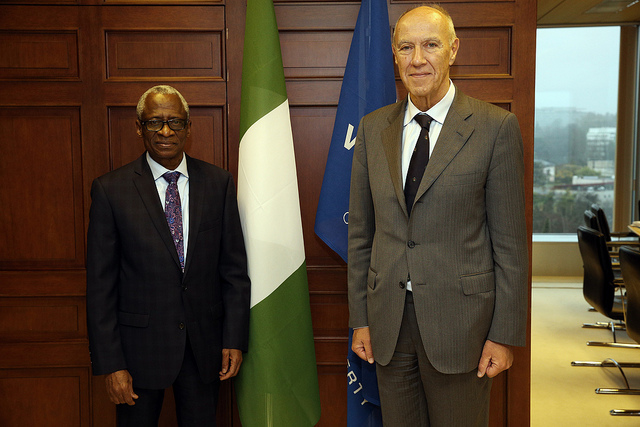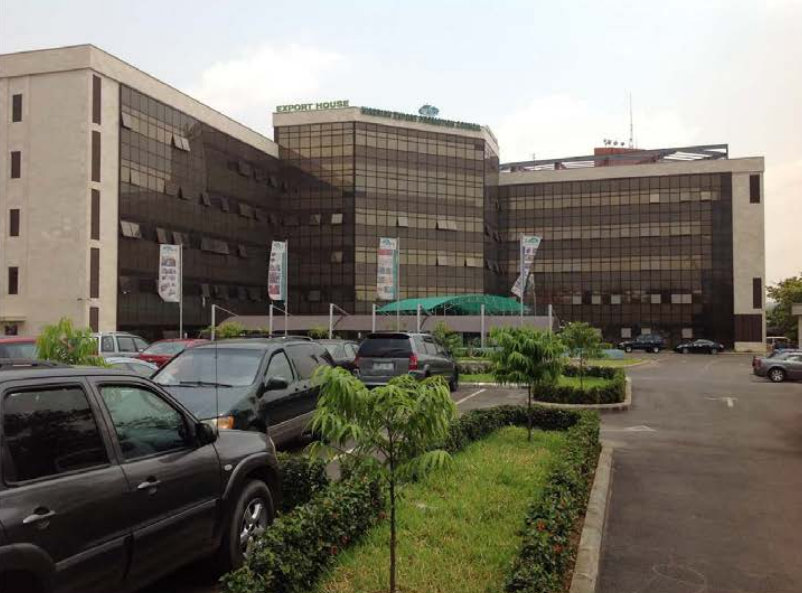
On 14 December 2017, the World Intellectual Property Organization (WIPO) Director General Francis Gurry and Ambassador Audu Ayinla Kadiri, Permanent Representative of Nigeria to the United Nations and other International Organizations in Geneva (pictured above), signed an agreement establishing a WIPO External Office in Nigeria. Headquartered in Switzerland since 1967, WIPO is a self-funding agency of the United Nations, with 191 member states. WIPO is the global forum for intellectual property (IP) services, policy, information and cooperation. WIPO’s network of External Offices (currently in Brazil, China, Japan, Russia and Singapore) are intended to provide cost-effective support services in relation to the Patent Cooperation Treaty (PCT), Madrid and Hague systems; arbitration and mediation; collective management; and development and capacity building. In a fast-changing world, WIPO reckons that its External Offices are an increasingly important part of the Organisation’s enhanced engagement with its Member States, partners and stakeholders, on the ground, to lead the development of a balanced and effective international IP system that enables innovation and creativity for the benefit of all.
Readers may recall that at the Fifty-Fifth Series of Meetings of the Assemblies of the Member States of WIPO (October 2015), the WIPO General Assembly, at its Forty-Seventh (22nd Ordinary) Session, decided with respect to the issue of new WIPO External Offices, during the 2016/17 and 2018/2019 Biennia that priority should be given to Africa. Subsequently, according to the WIPO Program and Budget Committee (WO/PBC/25/12), several African Member States had notified WIPO of their wish to host an external office namely Algeria, Cote d’Ivoire, Egypt, Ethiopia, Kenya, Morocco, Namibia, Nigeria, Rwanda, Senegal and Tunisia. However, at the expiry of the extended deadline of March 29th 2016, only six African countries had filed their hosting applications namely Algeria, Egypt, Tunisia, Morocco, Kenya and Nigeria.
At the Fifty-Sixth Series of Meetings of the Assemblies of the Member States of WIPO (October 2016), the WIPO General Assembly, at its Forty-Eighth (26th Extraordinary) Session, decided with respect to the issue of new WIPO External Offices, to open WIPO External Offices in Algeria and Nigeria. This blogger suspects that Algeria will cater for francophone Africa while Nigeria will cover the pre-dominant English-speaking continent. During the same meetings, Nigeria deposited four ratification instruments concerning the WIPO Copyright Treaty (WCT) of 1996, the WIPO Performances and Phonograms Treaty (WPPT) of 1996; the WIPO Beijing Treaty on Audiovisual Performances of 2012 (Beijing Treaty); and the Marrakesh Treaty to Facilitate Access to Published Works for Persons Who Are Blind, Visually Impaired or Otherwise Print Disabled of 2013 (Marrakesh Treaty) with WIPO.
The selection of Nigeria as a host country should be unsurprising: Nigeria is home to Nollywood, the largest film industry in Africa and the second largest in the world in terms of output. Nollywood produces about 120-200 low budget home videos every month (approximately 2,200-2,400 movies per year) which is viewed by over 300 million people in Africa and around the world. Nigerian music, film, literature and art resonates across Africa and around the world facilitating a cumulative annual output of approximately $2 billion across the recording industry, visual and performing arts, fashion, advertising, TV and broadcast, fine arts and handicrafts and publishing – the total of which contributes 1.42% to the country’s GDP. Nigeria enjoys a long-standing cooperation and engagement with WIPO which includes being the recipient of a WIPO Gold Medal in 1996 as a recognition of the country’s contribution to global IP issues and her domestic copyright policies and practices.

The proposed site of the WIPO External Office in Nigeria is Export House – Nigerian Export Promotion Council located in the capital city, Abuja. This government-approved 400sq metre office space is in the secure diplomatic Maitama district and in close proximity to several key institutions and social amenities. According to the Nigerian government, it is a a large office space that is in a prime location and could serve a multi-purpose role for the External Office including training activities, conference services, knowledge events and many more. Nigeria is indeed a thriving hub in international activities with 134 diplomatic missions, UN and specialised agencies, sub-regional and regional offices, multinationals and international organisations.